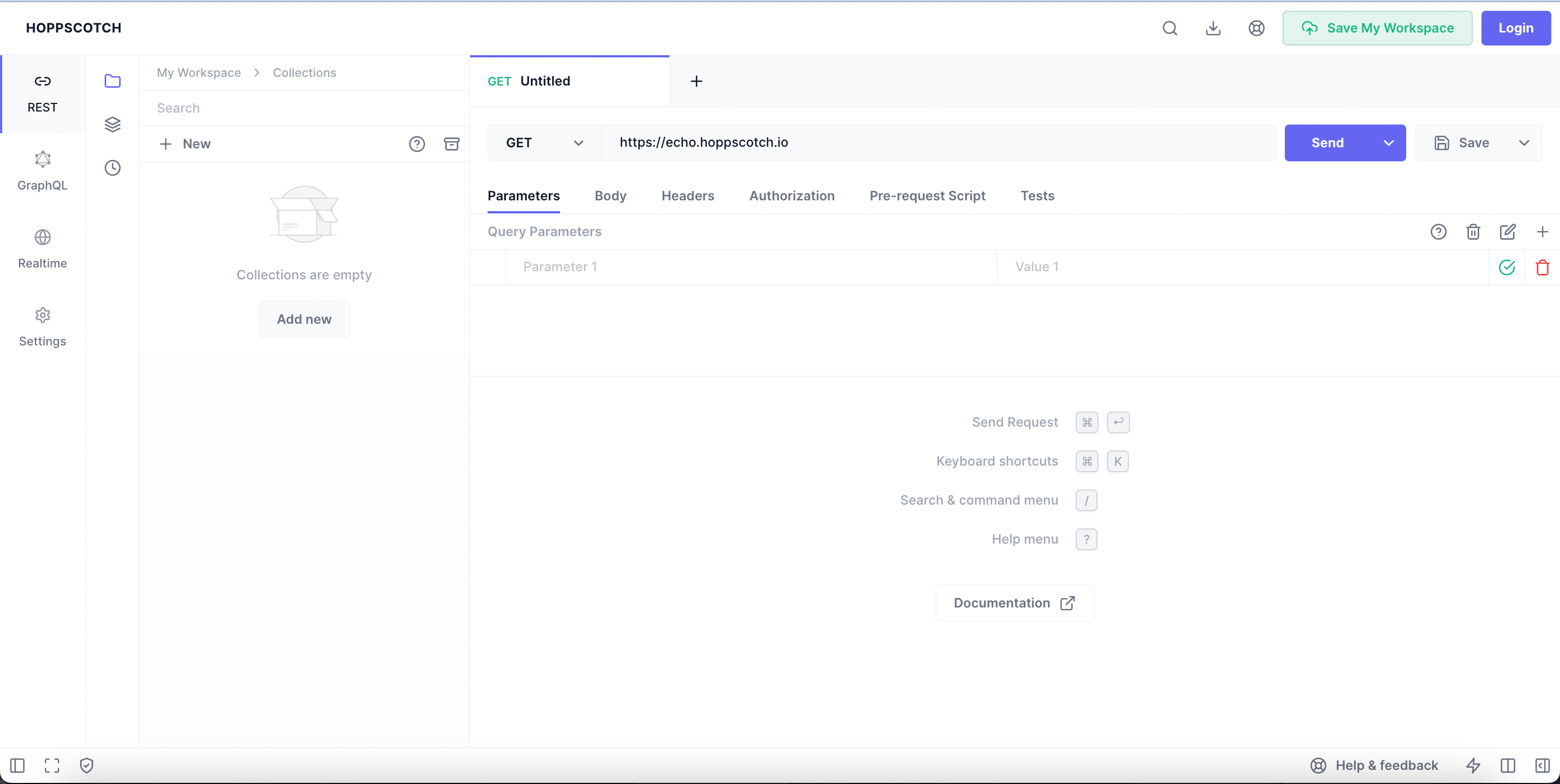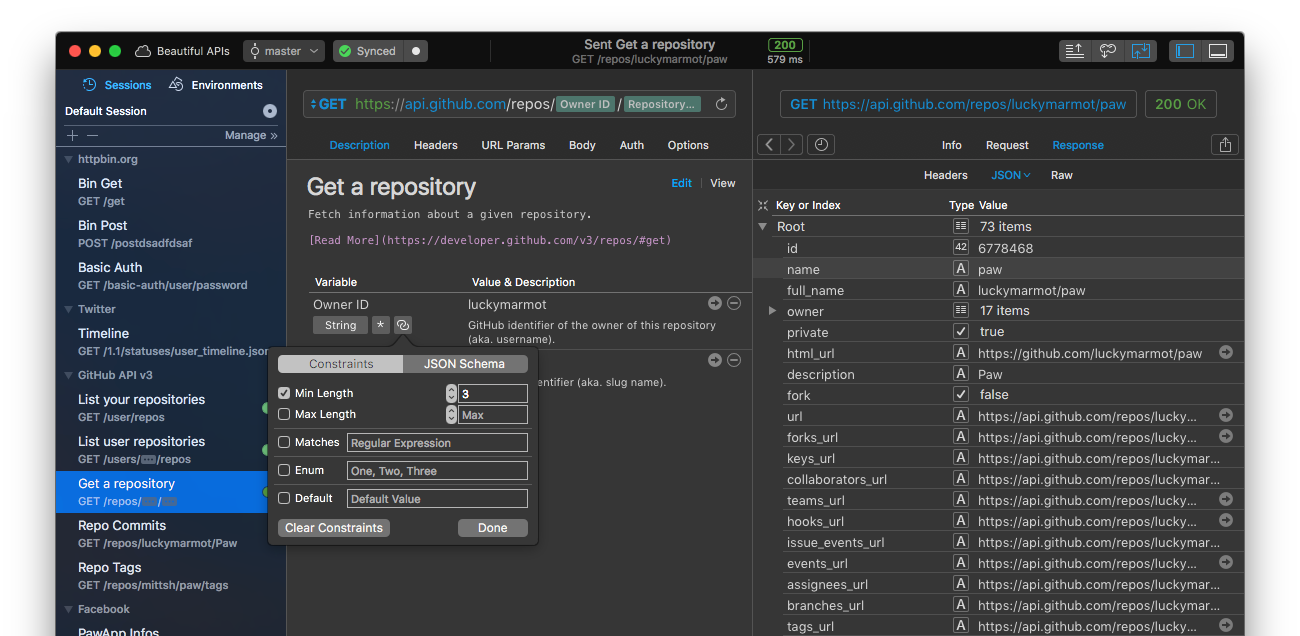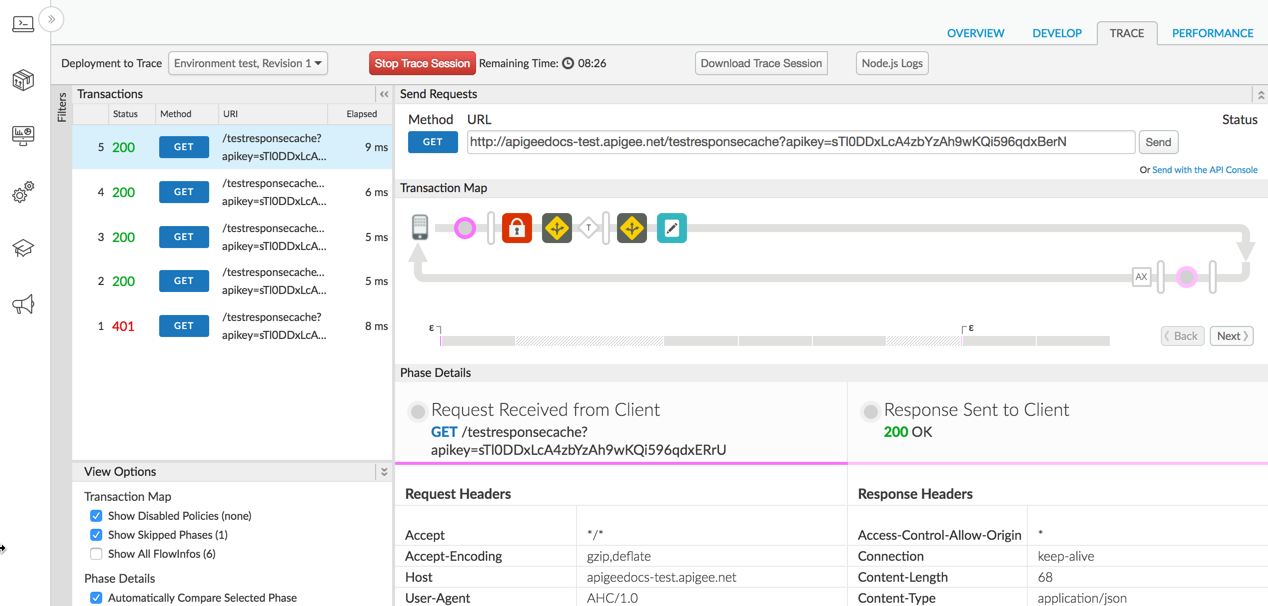Best Postman Alternatives for API Testing in 2025

Postman is a popular tool for API development, testing, and managing APIs for QA professionals. However, Postman is a comprehensive tool with complex design, which may not fit teams with more specific needs. In this article, we have listed out 15 best Postman alternatives, their strong features, and pricing plan for you to consider before switching.
16 Best Postman Alternatives (Free & Paid)
1. Katalon Platform

Katalon provides an all-in-one testing solution for any type of test project. It supports web, mobile, API, and desktop application testing. For API testing in particular, Katalon supports you throughout the entire API testing lifecycle, from test planning, test creation, to test execution and test reporting for many types of API requests on multiple environments.
- API Test Creation: Katalon comes with many codeless test authoring capabilities, including Built-in Keywords, which are readily available code snippets that you can drag and drop to build a full test, and Record-and-Playback, which allows you to record the sequence of your activities, auto-capture test objects, and turn them into a test script. This helps tremendously in creating even the more complex API narratives. Learn more about how it works in Katalon Studio.
- API Test Organization: all test objects captured are organized in a repository with clear hierarchy. These objects can be reused across a wide variety of environment and scenarios. Via Postman and repo integration, you can easily reuse existing API assets, or consolidate resources for team collaboration.
- API Test Execution: Katalon gives you access to many web and mobile environments to run your tests on. You can choose to run tests on cloud with Katalon TestCloud or run on your local environment through the CLI with Katalon Runtime Engine, which has many AI-powered features to support API test maintenance.
- API Test Analysis: after test runs, Katalon generates detailed reports with relevant metrics for you to monitor your efficiency and make data-driven decision.
- API Test Planning: integrate with Slack, Microsoft Teams, JIRA, and many collaboration platform for enhanced communication and visibility across teams

For example, after creating a test project in Katalon Studio, you can click on “Add Web Service Keyword” to generate test steps, which are “Send Request” and Verify Element Property Value" here, then simply drag-and-drop objects from the Object Repository on the left sidebar to define what those test steps include. Instead of writing code, you have constructed a full API test from scratch in seconds.
The tool is constantly adding in test integration features and improving over time, allowing users to scale up testing projects with confidence. Beside that, it also has a scripting mode for experienced testers, reducing the time it takes for API test creation. It is the perfect Postman alternative for teams of all scale and expertise.
Features:
- Productive IDE for API test automation, providing code-support features, code inspection, snippets, quick references, dual interface, debugger, and test maintenance features
- Supports all types of SOAP/1.1, SOAP/1.2, REST, and GraphQL requests
- Versatile options for testers to work with their API project: Keyword-driven testing or Page Object Model (POM) testing.
- Tests can be imported from Swagger, WSDL, and Postman
- Support data-driven testing for better test coverage and efficiency.
- Test artifacts can be reused across testing projects
- Diverse integration ecosystem supporting all stages of the STLC with native plugins for CI and DevOps best practices
- Data driven testing with multiple data sources (e.g. XLS, CSV) and databases supported. Katalon also supports BDD with Cucumber files and native Gherkin editor.
- Comprehensive reporting and test analytics
Here's a quick demo of how Katalon works:
Pricing: Katalon offers a Free Forever version to get you started immediately with codeless API, web, mobile app, desktop app test creation and cross-browser test execution. There is also a 30-day free trial for you to experience the full capabilities of Katalon.
2. Bruno

Bruno emerges as a fast and innovative open-source API client aimed at challenging the norms set by established tools like Postman and Insomnia.
What sets Bruno apart is its unique approach of storing API collections directly on your local filesystem, using a plain text markup language called Bru for managing API requests. This approach not only simplifies storage and version control but also enhances accessibility and transparency in managing API documentation and tests.
Unlike cloud-based tools, Bruno operates offline-only, ensuring maximum data privacy by keeping all collections securely on the user's device. This commitment to data security is a key feature for users who prioritize privacy and control over their API testing environments.
Features:
- Filesystem storage for API collections
- Uses plain text markup language (Bru) for API requests
- Seamless integration with Git and other version control systems
- Open-source with customization opportunities
Pricing:Open-source
Website: UseBruno
Git:Bruno
3. HTTPie

HTTPie is a command-line interface (CLI) HTTP client that allows users to send requests to web servers and APIs using a simple and intuitive syntax. It is similar to the popular tool cURL but offers a more user-friendly and intuitive experience. More than just API testing, HTTPie can be used for API debugging, web page scraping, and interacting with RESTful services.

Features:
- Formatted and colorized terminal output, which can be customized to include/exclude certain detail
- Built-in JSON support
- Forms and files uploads
- Arbitrary request data
- Custom headers
- Persistent sessions
- Wget-like downloads
- Linux, macOS, Windows, and FreeBSD support
Pricing: Open-source
Website: HTTPie
Git: HTTPie
4. cURL

cURL is a command-line tool for transferring data with URLs. It supports various protocols and is widely used for fetching or sending data to servers via HTTP, HTTPS, FTP, and more.
Features:
- Command-Line Interface: Operates entirely from the command line, making it scriptable and suitable for automation, ideal for integrating into CI/CD pipelines and testing workflows.
- SSL/TLS Certificate Verification: Supports secure connections with built-in SSL certificate validation, ensuring secure API interactions and verifying server authenticity.
- Platform Compatibility: Works seamlessly across multiple platforms including Windows, macOS, Linux, and more, ensuring consistency in API testing environments.
- Extensive Functionality via libcurl: Offers advanced features through the libcurl library, such as file transfers, proxy support, authentication mechanisms, and comprehensive HTTP method handling.
- Integration and Customization: Integrates with various programming languages and frameworks via bindings, allowing for extensive customization and integration into existing development ecosystems.
Pricing: Free
Website: cURL
Git: cURL
5. Swagger

Swagger is another powerful alternative to Postman with well-organized API documentation features. Swagger comes with smart error feedback and syntax auto-completion within API Editor, enhancing the API design experience. As developers design the API, Swagger will highlight any inconsistencies in the design compared with established standards. A library of reusable components can be built and shared across multiple APIs, reducing the amount of code to be written compared to Postman.
The Swagger Petstore is a sample API provided by Swagger/OpenAPI to showcase their capabilities. It is a RESTful API that manages pet data, allowing operations like creating, reading, updating, and deleting pets using HTTP methods such as GET, POST, PUT, and DELETE.

Features :
- Powerful API Design toolset
- API mocking to simulate the API behavior before it is built, which is useful for early API testing or prototyping
- Swagger can be seamlessly integrated into the CI/CD pipeline
- Swagger Codegen can generate server stubs and client SDKs for any API
- Swagger UI is highly customizable to tailor the API documentation to the testers’ specific needs
- Collaboration features for teams
- Support multiple API specs, including OpenAI, Swagger 2.0, and RAML
Pricing: Swagger offers flexible pricing from Free for Individual user to $95 annually for Team plan (3 users)
Website: Swagger
Git: Swagger
6. Hoppscotch

Hopscotch is an open-source API development and testing tool that can be used as a Postman alternative. It has a user-friendly interface to test and debug APIs. It is available as a web app, desktop app, browser extension, and can be used on Windows, macOS, and Linux. Hoppscotch supports REST, GraphQL, WebSocket, and other protocols.

Features:
- Free, lightweight, and immediately accessible - no need to create an account
- Clean interface to quickly create, test, and debug API requests
- Real-time request/response data
- Support a wide range of HTTP request types, including GET, POST, PUT, DELETE, PATCH, and OPTIONS
- Customizable headers and parameters to test many different scenarios
- JSON and form data support
- Automatic response validation based on the expected status codes and data formats
- Request organization into collections for easier management
- Code snippets
- Request import/export functionality
- Actively developed and maintained
Pricing: Free
Website: Hoppscotch
Website: Hoppscotch
7. JMeter

JMeter was an open-source performance testing tool primarily used to test web apps, APIs, and other network protocols (FTP, SMTP, etc). Most notably, it provides a wide range of functionalities tailored for API testing, such as HTTP requests, parsing responses, and asserting response data.
To test APIs using JMeter, you need to set up a Test Plan in JMeter. This involves adding a Thread Group, which determines the number of virtual users and how they are distributed over time, and an HTTP Request, which specifies the details of the API request such as the server, path, method, parameters, and headers. Optional assertions can be added to validate the response.

Once the Test Plan is configured, you can run the test and monitor the results using JMeter's listeners. By adding multiple Thread Groups and HTTP Requests, you can create more complex test scenarios. Remember to save your Test Plan and ensure that you have the necessary dependencies and plugins for your API protocols and authentication mechanisms.
Features:
- Full-featured IDE allowing teams to record interactions with web browsers and/or native apps using the HTTP(S) Test Script Recorder
- Effortlessly build, customize, and debug test plan on a well-designed UI
- Offers a Command Line Interface (CLI) allowing testers to run automated API tests in a headless mode
- Automatically identifies and extracts dynamic values from many data formats (HTML, JSON, XML, and stores them in variables
- Dashboard for visualization, aggregate and raw data report generation
Pricing: JMeter is open-source and free.
Website: Apache JMeter
Git: Apache JMeter
8. SoapUI

SoapUI is an API testing tool for both SOAP and REST testing. It covers the creation and execution of automated functional, regression, compliance, and load tests on Web API. Apart from functional testing features, SoapUI also offers security and load testing features. Users can leverage SoapUI’s easy scripting features: drag and drop or point and click.
With a simple and easy-to-use interface, testing with SoapUI is not too much of a challenge for users without a technical background. Testers and businesses can choose to work with the open-source or the paid version depending on their needs.
In comparison with Postman, SoapUI provides a wider range of features for API testing needs, such as SOAP testing, API discovery, automated assertion creation, templated data insertion, and open-source standards. Postman also lacks load testing and security testing capabilities that are available when testing with SoapUI.
Features:
- Support a wider range of protocols, including HTTP, HTTPS, JMS, AMF, JDBC, and more
- Provides data-driven testing, which is not supported by Postman
- Detailed reporting and analytics capabilities in various formats
- Support the creation of automated functional tests to validate the behavior of SOAP, REST, and other web services
- Support command line interface
- Scripts can be reused across projects
- SOAPUI allows for the creation of mock services that simulate the behavior of a real service, allowing for testing in isolation.
Pricing: SoapUI is a free open-source tool
Website: SoapUI
9. TestSigma

TestSigma is an interesting Postman alternative. It requires no coding and no setup to get started. TestSigma gives a high level of customization to API call sequences, matching the application workflow. API dataset can be stored as “parameters”, which can be populated across many tests, so testers don’t have to modify test scripts every time they run.
Test Sigma also offers different comparison modes that allow developers to choose the level of rigidity (Strict, Lenient, Non-extensible, Strict Order, etc.) for their requirements and validate API responses with varying degrees of comparison.

Features:
- Codeless API test creation
- End-to-end test automation for both API and UI testing
- Easy integration with Dev and QA toolchain
Pricing: TestSigma offers three packages: community, cloud, and enterprise. Community is open-source and free to use, while cloud and enterprise packages are paid.
Website: TestSigma
10. ReadyAPI

ReadyAPI is a comprehensive API testing tool developed by SmartBear that allows testers and developers to perform functional, performance, and security testing of APIs. It provides a user-friendly interface for designing, testing, and generating reports on API tests. ReadyAPI is designed to support both RESTful and SOAP APIs and can be used to test APIs developed in various programming languages.
Features:
- Low-code API functional, security, and performance testing
- Support a wide range of API type, including SOAP, REST, and cutting-edge use cases levering MQTT
- Point-and-click assertion logic insertion
- Diverse integrations for continuous integration and deployment
- Comprehensive reporting and analytics with up-to-date testing metrics, exportable as JUnit-style HTML reports, CSV, and more
Pricing: ReadyAPI for API Testing is available from $895/license, billed annually. The API Performance Module starts at $7308/license and API Virtualization Model at $1374/license.
Website: ReadyAPI
11. Assertible

Assertible is a cloud-based testing and monitoring tool designed to help developers and QA teams automate API testing and monitoring. The tool provides a range of features that help teams ensure their APIs are functional, secure, and reliable.
As a Postman alternative, Assertible offers advanced test automation features, including support for JSON Schema validation, parameterized testing, and assertion chaining for wider test coverage.

Features:
- Support dynamic variables, conditional logic, and webhooks, making it easy to test complex API workflows
- Run automated tests as part of your continuous integration and delivery pipeline
- Codeless API monitoring allows testers with minimal coding experience to test APIs, manage schedules, and check up on web service failures
- Real-time alerts via emails, SMS, or Slack when your API fails
- Collaborated API testing and monitoring
- Comprehensive reporting on API performance, response rate, error time, and more
- Integration with GitHub, Slack, Zapier, and more
- OpenAPI support
Pricing: Assertible offers a free plan with basic features, and its paid plans start at $50/month.
Website: Assertible
Git: Assertible
12. Paw

Paw is a macOS native application for API testing and development. It allows users to easily make HTTP requests, create and share API documentation, and mock APIs. Paw supports a wide range of HTTP protocols and authentication methods, as well as allowing users to write custom scripts and plugins to extend its functionality.
Paw promotes teamwork. It allows developers, testers, and other stakeholders to contribute to the API testing activities with real-time updates on the status.

Features:
- Highly compatible with macOS
- Full-featured visual editor and HTTP toolset
- Support JSON schema and is fully compliant with Swagger and RAML descriptions
- Support both OAuth 1.0 and 2.0
- Built-in mock server
- Code generation for a variety of languages, including Objective-C, Swift, and JavaScript
- Automatically generate API documentation from API requests
Pricing: There is a Free for Personal and Professional use, then its paid plan starts at $60/month for 6 users
Website: Paw
13. Karate Labs

Karate is an automation testing framework written in Java that supports API automation, API mocking, performance testing, and UI testing. Karate’s syntax is easy to understand for non-programmers or testers who are new to API testing. It generates HTML-based test reports that provide a comprehensive view of test results, including detailed information about test steps, HTTP requests and responses, and assertion failures.
Features to Highlight:
- Low learning curve
- Native support for Gherkin syntax
- Built-in HTTP client that can be used to make REST API requests without the need for additional libraries or tools
- Highly extensible with custom Java code
Pricing: Free open-source framework
Website: Karate
Git: Karate
14. Tricentis Tosca

Tricentis Tosca is an enterprise-level software testing tool designed to automate end-to-end functional testing, integration testing, and regression testing of applications.
Tosca offers a model-based approach to testing, which allows users to create and maintain test cases at a higher level of abstraction, using visual representations of the application's business processes.
For API testing specifically, Tricentis offers the Tosca API Scan Module. It allows users to create test cases using simple drag-and-drop actions, making it easy to design complex test scenarios without writing a single line of code. API and UI tests can be combined to create truly automated end-to-end test scenarios spanning across web, mobile, SAP, and more.
Features:
- End-to-end API testing across a wide range of environments
- Automatically generate test cases from API documentation
- Scriptless test creation for reduced learning curve, higher clarity, transparency, and enhance collaboration
- Extensive API testing capabilities, supporting popular protocols and formats
- Scalable along with your API testing projects
- Automatically analyzes the captured requests and responses, extracts the relevant data, and converts them into business-readable test cases that accurately represent the API's behavior
Check out Tricentis's features in head-to-head comparison with Katalon Studio:
Pricing: Being an enterprise-level tool, its pricing is only available upon request.
Website: Tricentis
15. LoadNinja

LoadNinja is a cloud-based load testing tool that helps testing web applications by generating virtual user traffic. Testers can simulate user traffic from different geographical locations, browsers, and devices to identify potential bottlenecks and performance issues in the application.
LoadNinja provides a user-friendly web-based interface for creating complex API test scenarios. You can easily generate an authentication request and re-use the token for subsequent requests without having to write any scripts. You can even customize the think time and other parameters to create highly realistic tests.
There is also a machine learning assistant that can detect anomalies automatically. The test results page displays essential statistics such as navigation timings and transactions per second.
Features:
- InstaPlay Recorder to easily create web and API load tests in minutes, no coding required
- Browser-based UI for building complex API scenarios for accurate results
- Cloud-based API Load Testing
- Integrated performance metrics for actionable insights and root cause analysis
- Integration into any CI/CD pipeline
Pricing: There is an on-demand plan. The Subscription-based plan starts at $105/month billed annually.
Website: LoadNinja
16. Apigee

Apigee is an excellent Postman alternative. It is Google Cloud’s native API management tool to build, manage, and secure APIs across a wide range of environments, use cases, and scale.
Apigee Edge Platform is the core component of Apigee, providing a range of tools and services for managing the entire lifecycle of an API. There is also a set of policies and access controls to secure the API, a traffic management system to control and optimize API traffic, and a set of analytics and monitoring tools to track API usage, performance, and other key metrics.
Another key component of Apigee is the Developer Portal, which enables organizations to publish and manage their APIs, providing documentation, SDKs, and other resources to help developers easily discover and use the APIs.

Features:
- Support multiple programming languages and frameworks to perform API testing
- Security and access control to protect sensitive data from unauthorized access.
- Real-time analytics
- Third-party tool integrations
- Automatic scaling, load balancing, and failover, ensuring that APIs are always available and responsive.
Pricing: You must contact Apigee for a quote, but they do offer a free trial.
Website: Apigee
Git: Apigee
How To Select The Right Postman Alternative

When selecting the right alternative to Postman, there are a few factors to consider.
- You need to carefully evaluate the specific needs of your API testing and development workflow to determine if you require features like automated testing, collaboration capabilities, CI/CD integration, or advanced reporting.
- Consider the ease of use and learning curve associated with the alternative tool.
- Look for a tool that offers a user-friendly interface and intuitive navigation.
- Compatibility with various platforms, operating systems, and API protocols is also extremely crucial for seamless integration into your existing tech stack.
Most importantly, it is about understanding the strong and weak points of Postman, then compare them with your tool of consideration.
Postman works on all major platforms, including Windows, macOS, and Linux. Individual developers can use Postman’s free version for their basic and simple requirements, and businesses can look for more in their commercial versions. Now identified as a collaboration platform for API development, the tool aims to simplify building an API and streamline team collaboration to make APIs creation better and faster.
The Advantages of Postman
- Ease of use: A new user to Postman only has to sign up, download the tool, and log in to their account to get started
- Simplified API: Postman users can begin their API journey quickly and effectively using Postman’s comprehensive platform and wide support for all possible HTTP methods.
- Robust testing capabilities: Postman supports multiple testing environments, test checkpoints, and scheduling options.
- Integration and collaboration: Postman Workspace is dedicated to real-time collaboration between teams with built-in version control. The tool integration ecosystem is growing, with major names constantly being added.
The Limitations of Postman
Although Postman has proven its capabilities in providing a holistic experience for developers to perform testing with their web services, it still falls short in several criteria. Most significantly, Postman is ideal for manual testing needs while the world is turning its focus more toward continuous testing tools.
Here’s a closer look at Postman’s limitations for automated testing demands:
- Postman is not built for automated test validation, making it hard to ensure stability in performance.
- Reporting is only available in Enterprise plan
- Low script reusability leading to duplicate effort for any new API testing project
- Lack of test maintenance features
- It lacks support for CI/CD integrations and shift-left or Agile processes to meet QA teams’ demand since it was originally designed as a standalone tool for developers and testers, rather than as part of a larger DevOps toolchain
Indeed Postman is a popular tool for API testing and development, but there are many Postman alternatives available that better suit your needs depending on your specific use case. When exploring these options, make sure to weigh their pros and cons to find the best fit for your team and improve your API testing and development workflow.





